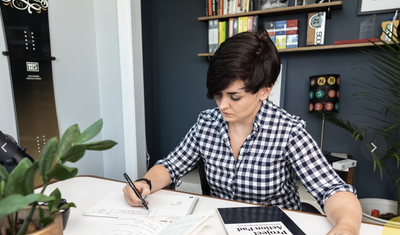
I became a parent 10 months ago when I had my daughter.
And wow. I underestimated what it takes not only to take care of these tiny humans. I tweeted this out after solo parenting for a few days:
Confident that 95% of jobs are easier than being a stay-at-home parent.
— Cathryn (@cathrynlavery) January 3, 2023
But besides keeping her alive, how do I teach her all I want to teach her?
I mean… That’s what it’s all about, right? Passing on the lessons I’ve learned so she doesn’t have to go through my same hardships and instead, blaze her own trail.
Will she become a genius in whatever field she decides to pursue (hopefully not architecture 🙄)? Time will tell.
But these are the 4 lessons we’re prioritizing:
1. Encourage a love of learning & curiosity
Above all, I think curiosity and a love of learning are highly correlated with success. I’ve seen it enough times to notice a trend.
I think all kids are born curious about the world and our job is to keep this curiosity thriving… even when it’s tiring. I have to remind myself of this as a parent every time I see my daughter find her way into everything she isn’t supposed to.
So next time you feel frustrated about your kid being curious, think of how this curiosity could help them in the future.
Along with curiosity comes a general love of learning. My parents brought me up with a love for reading which I want to pass on to my daughter. I want to gamify this concept somehow so that every time she learns a new skill or reads a new book she considers herself “leveled up”.
“Read what you love until you love to read.”
— Naval
Ways to enhance curiosity:
- Asking questions
- Trying new things
- Leaving your comfort zone
- Letting go of your pre-conceived notions
The more we encourage our kids to explore and ask questions, the more we’ll positively reinforce those efforts and accomplishments. Leading them to be as curious and open as possible.
2. Teach financial literacy
It’s never too early to start teaching your child about money and financial management.
Quinn is less than one year old and can’t balance a budget… Yet.
Once she grasps the concept of money, we’ll start introducing topics like budgeting, saving, and investing.
I think we’ll even let her practice with a small allowance. ¯(ツ)/¯
Because what better way to learn than the ability to actually do it? I like this hands-on approach and I’ve learned from other friends who are parents this is effective in teaching them the basics.
As she gets older, we’ll introduce her to more advanced money topics like credit and debt management.
We’ll also make sure we model good financial behavior – like saving for big purchases and avoiding unnecessary debt (or leveraging it in some cases).
Practice what you preach, right?
Recommended resource:
There’s a great podcast I’d recommend by Ramit Sethi (author of I Will Teach You to Be Rich), one of my top recommended money books. The podcast is like relationship therapy, but for money where he interviews real-life couples.
What’s fascinating about the couples he interviews is that many of the issues and mindsets around money have come from how each person was brought up. It’s made me realize how crucial the younger years are with kids and how we as parents can shape a lifelong attitude towards money.
3. Encourage creativity & innovation
You probably associate genius with creativity and outside-the-box thinking.
Think Einstein. Da Vinci. Jobs.

As parents, we can really bring out these qualities in our kids by providing opportunities (a variety of them!) to be creative. Think art supplies, computers and musical instruments.
Encourage your child to come up with their own ideas and solutions to problems. And provide positive reinforcement when they do.
Some of my best memories as a child were in the summers when we would go up to Donegal, a small town in the north of Ireland. We had no phones, internet and a TV that barely got 3 channels worked so we had to improvise. Creativity comes when resources are scarce
The impact of creativity on your kid’s happiness levels is immeasurable.
Children with a high level of creativity interpret happiness as an emotional phenomenon. Their image of happiness is characterized in terms of social interaction and a focus on other people. Children with a low level of creativity correlate happiness with the satisfaction of their material needs. Their image of happiness is less associated with other people, it is impersonal and concrete.
4. Give them independence
As they grow, your kid has to learn personal responsibility.
Encourage them to take responsibility for their actions, make their own well-informed choices, and learn to live with the consequences of those choices.
It’s such an important factor in building self-confidence and independence. Encourage them to …
- Set their own personal goals
- Explore new activities and hobbies
- Take on leadership roles in school, sports, and organizations
From my own life, I can 100% say that when I moved to New York City with a few hundred dollars in my pocket and knowing hardly anyone, that’s when I learned the importance of self-determination.
The best thing my parents ever gave me was the ability to be independent.
I know when I decided to move across the pond it was extremely difficult for my mum. Yet she never tried to change my mind, and in fact, was always supportive of me and my goals — even though she was personally going to miss me.
Will I be like that with my own daughter? It will be hard but I hope so.
Now it’s important to remember that every child is different and that what works for mine may not work for yours. In fact, there’s a good chance that what I think will work for mine now will not actually work too 🤣
Keep in mind raising a “genius” isn’t the primary goal of parenting. The goal is to raise a happy human being. With the tips above and a lot of love and patience, you can give your child the tools they need to succeed in life.
I’ll report back with lessons I learned along the way. Because believe me, there will be plenty.
So I’m curious – What lessons do you think are crucial to teach our kids so they can grow up to be healthy, happy humans?
Become a subscriber receive the latest updates in your inbox.





